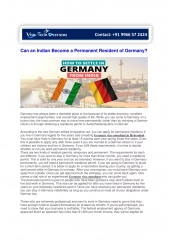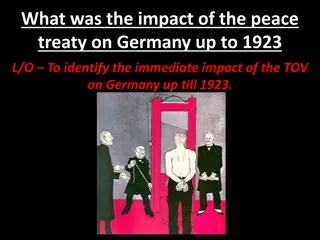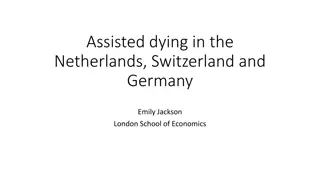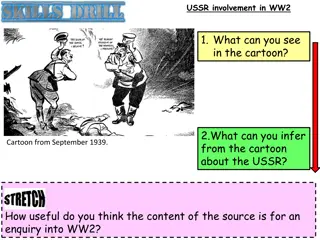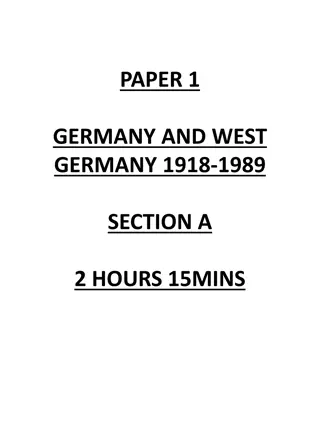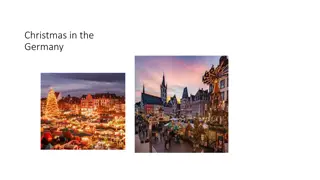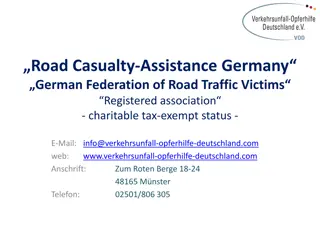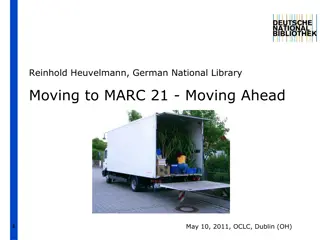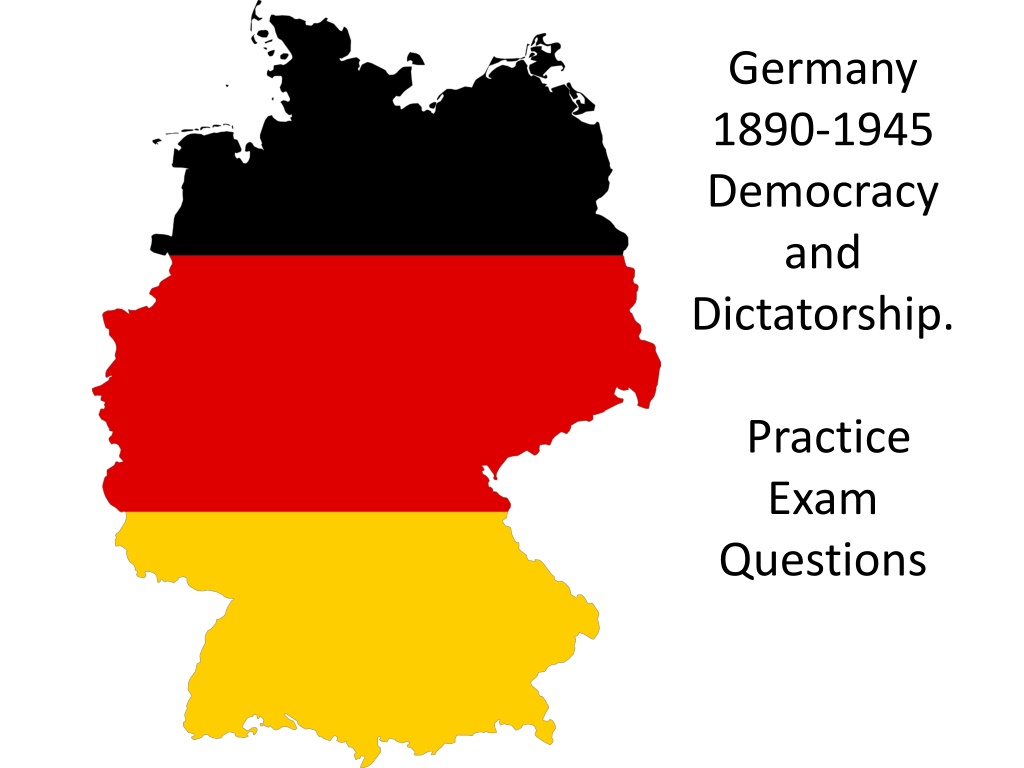
Germany 1890-1945: Democracy and Dictatorship Exam Practice
Prepare for your exam on Germany from 1890 to 1945 with these practice questions covering topics such as Weimar Republic, Nazi tactics, impacts of World War I, and more.
Download Presentation

Please find below an Image/Link to download the presentation.
The content on the website is provided AS IS for your information and personal use only. It may not be sold, licensed, or shared on other websites without obtaining consent from the author. If you encounter any issues during the download, it is possible that the publisher has removed the file from their server.
You are allowed to download the files provided on this website for personal or commercial use, subject to the condition that they are used lawfully. All files are the property of their respective owners.
The content on the website is provided AS IS for your information and personal use only. It may not be sold, licensed, or shared on other websites without obtaining consent from the author.
E N D
Presentation Transcript
Germany 1890-1945 Democracy and Dictatorship. Practice Exam Questions
4 mark description Questions Describe two problems faced by the German government in dealing with hyperinflation. Describe two aspects of the Weimar Constitution Describe two aspects of the Reichstag Fire Describe two problems faced by Kaiser Wilhelm II s governments in ruling Germany up to 1914 Describe two impacts of the First World War on Germany Describe two Nazi tactics to gain more votes in the 1920s Describe two aspects German culture in the late 1920s Describe two aspects of the Kapp Putsch Describe two aspects the political system of Germany in the 1890s Describe two ways the lives of Jewish people were affected by the Nazi Party Describe two ways Nazis took control of churches Describe two ways the Nazis controlled opposition in the 1920s and 1930s
8 mark explanation questions In what ways were the lives of women in Germany affected by Nazi social policies? Explain your answer In what ways did the lives of people in Germany change during the First World War? Explain your answer In what ways did the Nazis try to gain more votes in the 1920s? Explain your answer In what ways did the Nazis change their tactics after the great Depression? Explain your answer In what ways was the Munich Putsch a failure for the Nazi Party? Explain your answer In what ways did the Treaty of Versailles affect Germany? Explain your answer In what ways was the period 1924-28 the Golden Years for Germany? In what ways did the Nazi Party improve the economy of Germany? In what ways did the Nazis persecute undesirables ? In what ways did people oppose the Nazis?
12 mark comparison questions Which of the following was the more important reason why the Weimar Republic was in danger in the years 1919-1923; economic problems or political unrest? Which of the following was the more important reason why Hitler was appointed Chancellor of Germany in 1933; the economic weakness of the Weimar Republic or the political weakness of the Weimar Republic? Which of these was the biggest concern to the new Weimar government and Ebert; Political Uprisings or Financial problems? Which of the following groups of people were more affected by Nazi policies between the years 1933-1945; Workers or Young people? Which of these was the main reason the Nazis gained more votes in the 1930s; the Great Depression or propaganda? Which of the following had the greater impact on the German people; The Treaty of Versailles or Hyperinflation? Which of the following was the more important reason why Hitler was able to consolidate power; the Reichstag Fire or the Night of the Long Knives? Whose lives were affected most by the Nazi party; women or young people? Which of the two was most important in helping the Nazis control people within Germany; Propaganda or Police State
1. How does Interpretation B differ from Interpretation A about Hitler s appeal to the people of Germany? (4 marks) 2. Why might the authors of Interpretations A and B have different interpretations about Hitler s appeal to the people of Germany? (4 marks) 3. Which interpretation do you find more convincing about Hitler s appeal to the people of Germany? (8 marks)
1. How does Interpretation B differ from Interpretation A about life for young people in Nazi Germany? (4 marks) 2. Why might the authors of Interpretations A and B have different interpretations about life for young people in Nazi Germany? (4 marks) 3. Which interpretation do you find more convincing about life for young people in NaziGermany? (8 marks)
1. How does Interpretation B differ from Interpretation A about the reasons Germany built their navy? (4 marks) Interpretation A: Adapted from the Kaiser s autobiography in 1926. I had a peculiar passion for the navy. It sprang to no small extent from my English blood. When I was a little boy I admired the proud British ships. There awoke in me the will to build ships of my own like those someday, and when I was grown up to possess as fine a navy as the English 2. Why might the authors of Interpretations A and B have different interpretations about the reasons Germany built their navy? (4 marks) Interpretation B: From an Historian in a book entitled Origins of the First World War written in 2007. Although Tirpitz was principally concerned with the creation of a navy for its own sake and as a means of achieving a not very clearly defined position as a world power, he was also aware of the role the navy might play in providing a new rallying point for German opinion. He hoped that naval building would encourage people to support a strong government in Germany. 3. Which interpretation do you find more convincing about the reasons Germany built their navy? (8 marks)
1. How does Interpretation B differ from Interpretation A about German reactions to the Treaty of Versailles? (4 marks) Interpretation A: A German cartoon showing their reaction to the reparations payment. The caption read Germany, work! The liars blamed us for the war. Now they also burden us with reparations 2. Why might the authors of Interpretations A and B have different interpretations about German reactions to the Treaty of Versailles? (4 marks) Interpretation B: The amount of reparations Germany was told to pay was not very much. In 1919 a strong Germany was left surrounded by a string of small states who had to rely for their security on other countries. This was the worst part of the peace treaty. 3. Which interpretation do you find more convincing about German reactions to the Treaty of Versailles? (8 marks) from The Carthaginian Peace (1945) by ETIENNE MANTOUX, a French historian
Interpretation A: From Germany by Jon Nicol and Robert Gibson in 1985, this was written by a German poet who lived in Berlin in the 1920s. Theatres, opera and concerns houses were filled to capacity. European artists from Paris, London and Rome who came to Berlin were excited by it and didn t want to leave. The atmosphere was electric. 1. How does Interpretation B differ from Interpretation A about Weimar art? (4 marks) Interpretation B: Adapted from a letter written by Professor Willy Moillard of the Berlin School of Art, to the Nazi Minister of Science and Art in 1933, about the changes to German art in the 1920s. In recent years, developments in art have led to chaos. The experimental ideas that have been pushed on German art must be taken care of, everything that encourages the criticism of government must be thrown out, just as the new government has already done in political and economic life. 2. Why might the authors of Interpretations A and B have different interpretations about Weimar art? (4 marks) 3. Which interpretation do you find more convincing about Weimar art? (8 marks)
1. How does Interpretation B differ from Interpretation A about the impact of WW2 on the German people? (4 marks) Interpretation A: Adapted from Frauen, by Alison Dwings in 1993, in which Frau Margarete Fischer, interviewed in 1982, recalls the bombing in 1942. You can t imagine the blackout; I longed for a full moon so I didn t fall into holes in our streets. I was buried in a cellar four times during bombing attacks. I had to leap from a train several times when they were bombed. We didn t blame people; Hitler said the war was necessary. We only had to survive it. 2. Why might the authors of Interpretations A and B have different interpretations about the impact of WW2 on the German people? (4 marks) Interpretation B: From World at War by Richard Holmes in 2007, in which Albert Speer, Hitler s Armaments Minister, is interviewed. In the Ruhr valley, almost every night there were bombing alarms for weeks and weeks and only when it was pouring rain they maybe had one night s sleep. But work went on there in spite of that, morale was still there. 3. Which interpretation do you find more convincing about the impact of WW2 on the German people? (8 marks)
Interpretation A: From Account Rendered by Melta Maschmann in 1964. Maschmann joined the League of German Girls in March 1933. She was arrested after the war as a Nazi Party member and set to prison. 1. How does Interpretation B differ from Interpretation A Hitler youth clubs? (4 marks) I remember with more pleasure the weekend outings, the hikes, sports, campfires and youth hostelling. Occasionally there would be field exercises with neighboring groups. I began to play truant from school as work for the Hitler Youth took more and more of my time and energy. I would often leave the house at 5am and only arrive at school for the second or third lesson. 2. Why might the authors of Interpretations A and B have different interpretations about Hitler youth clubs? (4 marks) Interpretation B: Adapted from an account by a young German whose parents were teachers and allowed him to read banned books. In his account his remembers his time in the Hitler Youth during 1940. 3. Which When I was older, I became a Hitler Youth leader. I found the need for absolute obedience unpleasant. The Nazis preferred people not to have a mind of their own. In our troop the activities consisted almost entirely of endless military drill. Even if sport or shooting practice or a singalong was planned, we always had to drill first. interpretation do you find more convincing about Hitler youth clubs? (8 marks)
Interpretation A: General Halder, Chief of the German General Staff, speaking at the Nuremberg War Crimes trial, 1945 1. How does Interpretation B differ from Interpretation A about the Reichstag Fire? (4 marks) At a luncheon on the birthday of the Fuhrer in 1942 the conversation turned to the topic of the Reichstag building. I heard with my own ears when Goering interrupted the conversation and shouted: The only one who really knows about the Reichstag is I, because I set it on fire! 2. Why might the authors of Interpretations A and B have different interpretations about the Reichstag Fire? (4 marks) Interpretation B: From Goering s testimony at van der Lubbe s trial I knew that the Communist Party was the culprit 3. Which interpretation do you find more convincing about the Reichstag Fire? (8 marks)







